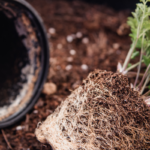Rosary peas are a highly-toxic plant that produces striking red-and-black seeds. They are one of the most toxic plants in the United States and are also notoriously hard to grow. If you’d like to try your hand at propagating rosary peas, you might wonder how to successfully grow them from seed.
Rosary pea seeds should be scarified before they are placed in potting soil. Rosary pea seeds can be scarified in hot water to help encourage germination. This helps to mimic the natural process the seeds experience when they are ingested by an animal and passed through their digestive system.
In the rest of this article, we’ll talk more about how to scarify your rosary pea seeds so that they have a good chance of germinating.
What Does It Mean To Scarify Seeds?
Some species of plants require more than just damp soil to germinate. Instead, germination is started once the seeds pass through an animal’s digestive system, where they experience a damp, warm environment and physical trauma. These conditions signal to the seed that it’s time to grow.
Without these conditions, seeds from these plant species struggle to germinate. No matter how long you leave them in the soil, they are unlikely to sprout. If you want them to grow, you’ll need to recreate the environment they’d naturally experience.
Scarification is the recreation of these natural conditions. There are different methods that can be used for specific plant species–burning, etching, etc. It’s important to follow the method that is designed to work best with each plant species.
For rosary peas, the best method of scarification is to soak them in very hot water. The seeds should stay in the hot water until they swell; at this point, they can be placed in soil, where they will germinate. The heat and moisture the seeds experience through scarification closely mimics passing through an animal’s digestive system, signaling to the seed that it’s time to grow.
When scarifying rosary pea seeds, only plant the seeds that have successfully swelled up. If any of them fail to swell, continue soaking them in the hot water until they do. If after several tries they don’t swell, they are unlikely to germinate and can be tossed in the trash.
Staying Safe When Working With Rosary Pea Seeds
Rosary pea seeds contain a toxin called abrin. This toxin is incredibly dangerous and can be fatal if you are exposed to it in large quantities. However, it’s highly unlikely that you’ll experience abrin poisoning from working with rosary pea seeds as long as you handle them properly.
The most important rule to follow when working with rosary pea seeds is to never eat them. Eating rosary pea seeds causes you to consume large amounts of abrin, leading to diarrhea, vomiting, dehydration, seizures, or bloody urine.
Left untreated, abrin poisoning can be fatal. As long as you don’t eat rosary pea seeds, and keep them out of reach from children and pets, you shouldn’t have to worry about it.
To be extra cautious, you should wash your hands thoroughly after handling rosary pea seeds. This will eliminate any abrin residue you might have picked up from touching the seeds.
Rosary peas are a fun and beautiful plant. By scarifying the seeds and practicing safe handling tactics, you can successfully–and safely–grow this striking plant.



